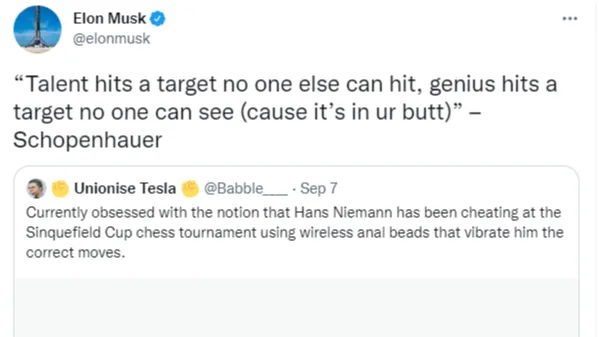Sexy Cheating at Chess
Mark Honeychurch - 27th September 2022
In this day and age, with the internet as a handy tool, it doesn’t take long for an offhand comment on Twitter or Facebook to become a rumour, and from there to mutate into a conspiracy. Sadly, much of the time these rumours are both extremely unlikely and very boring. However, the recent story about a stoush between veteran chess grandmaster Magnus Carlsen and teenage newcomer Hans Niemann had me laughing when it was relayed to me at a recent Skeptics in the Pub event, so I figured I’d glance my skeptical eye over it. And now you all get to read my musings.
The genesis of this story is that Magnus Carlsen and Hans Niemann had been battling it out at the chessboard at the Sinquefield Cup earlier this month. Carlsen, who seems to be considered the best chess player in the world at the moment, had won his last 53 consecutive matches, and also had the added advantage in this match of playing the first move against the 19 year old newcomer. Despite this advantage, Niemenn played such a strong game that Carlsen eventually resigned the game and then, in a surprise to everyone, quit the entire tournament.

Magnus Carlsen (left) vs Hans Niemann
This win is so unexpected that even Niemann seems to consider it to be a mark of shame for Carlsen, provocatively telling Vice “It must be embarrassing for the world champion to lose to an idiot like me. I feel bad for him.”
Since the match, Carlsen has been dropping hints on social media that he thinks Niemann cheated - for Carlsen, this seems to be the most reasonable explanation for how someone so young and inexperienced would be able to beat him. And this accusation isn’t without merit - Niemann has admitted to having cheated twice in the past when playing online games, using a computer program to help him make his moves. But he swears he didn’t cheat this time.
It was back in 1997 when a chess computer program first proved itself to be as good as the best human players, with IBM’s Deep Blue beating grandmaster Garry Kasparov. And since around 2006, software run on desktop PCs has been capable of beating the best human players in the world. So these days anyone using the assistance of a “chess engine”, as these pieces of software are known, can be pretty much guaranteed to win at chess.

Garry Kasparov (left) vs Deep Blue
Some players have tried to cheat solo in the past, using excuses like toilet breaks to access the information they need. Even just an occasional hint can be useful in chess, as not every move requires the aid of software for advice - in every chess match there are usually a few key points where a suggestion from a computer can make a major difference to the outcome of the game. However when people cheat these days at chess matches (and it does happen, sadly), it can also involve the help of an accomplice, along with some way of signalling the desired moves to the cheating player. This can be done not only using a voice capable device like an ear piece to verbally relay the move to the player, but also by using a more basic signalling device and a pre-agreed code.
One famous instance of cheating with a code, though not for chess, was an early attempt to game the popular TV quiz Who Wants to be a Millionaire in the UK. Retired army officer Major Charles Ingram is alleged to have used pagers strapped to his four limbs to allow a friend to “buzz” him with the correct answers, by calling one of four phone numbers corresponding to whether the answer was A, B, C or D. Although Ingram denies this, he also denied in court that he used a coughing accomplice in the audience to give him the answers when he appeared on the show a second time - and on that occasion he won the million pound prize.
This recent case of supposed chess cheating was given a spicy twist when someone made an offhand comment on Twitter which was amplified by Elon Musk (who has 107 million twitter followers!). The comment accused Niemann of using internet connected vibrating anal beads as the method of communication:
“Currently obsessed with the notion that Hans Niemann has been cheating at the Sinquefield Cup chess tournament using wireless anal beads that vibrate him the correct moves.”

Now, many commentators have done a fantastic job of analysing this cheating accusation from the angle of Niemann’s choice of moves, his entire history of professional play, and more. Most of what I’ve found online is far too technical for me to understand, but it’s obvious from a quick search that experts are falling on both sides of this debate, and there’s no clear answer either way. But I’ve not really seen anyone tackling this from the other side - looking at the feasibility of using a remote controlled sex toy to send a coded message. So, as an IT professional and tech enthusiast, I see it as my duty to at least give this one a try!
It won’t surprise many readers that, in the age of the Internet of Things (IoT), pretty much everything has been connected in some way to the internet - sex toys included. In fact, there’s long been a technical name for this subset of sex toys - teledildonics. I’ve known about remotely controlled sex toys for a while now, but had to do some specific research to find out whether anyone is selling remotely controllable anal devices. And, of course, the answer is a definite yes - but with some caveats.
The first issue here is that anal beads aren’t really the kind of device that would usually be capable of vibrating. Anal beads, for the uninitiated, are a series of spheres on a thin flexible length of silicone or other suitable, often flexible, material. People derive pleasure from these beads being inserted into their anus and pulled back out again. However these toys are usually very thin objects, without much room for embedding vibrating components, batteries or wireless communication hardware. I suspect that the rogue tweeter was likely mixing their words up, and meant to talk about a butt plug. So, for the rest of this article I’m going to focus on the much more feasible scenario of a remotely controlled vibrating butt plug.
Butt plugs are much larger and more sturdy items than anal beads, being very similar to vibrators. And, like vibrators, it turns out that companies have been enabling remote control of butt plugs for a few years now. Popular devices include the Lovense Hush and Hush 2, Loverbeby Prostate Massager, OhMiBod Lumen, De Joue Nuo and We-Vibe Ditto. Some of these devices seem to be described as “anal bead butt plugs”, but really to me they just look like ribbed butt plugs.
Back to chess… the Sinquefield Cup is hosted by the St Louis Chess Club, as part of the US Grand Chess Tour. The Grand Chess Tour regulations state that a “Classical Event” match can last:
“90 minutes for 40 moves and 30 minutes for the rest of the game; plus 30 seconds increment from move 1”
These times are for each player - so a player has up to 90 minutes for their first 40 moves, as well as 30 minutes for the rest of their game; and, on top of that, their timer gets 30 seconds added to it every time they make a move. In practice this means that a game can last several hours.
Vibrating butt plugs advertise a battery life of just 1 to 2 hours, which would suggest they wouldn’t last an entire match. However, this is measured as time the device is both turned on and vibrating. If a device is passively online and waiting for commands most of the time, and only vibrating sporadically, you would expect this to last longer. I’ve found mention online of standby time of around 24 hours for one particular model - the Lovense Hush. This was reported in an Amazon review by a user of the product, so I have no reason to doubt it.
Speaking of the Hush, one of its key attributes (and presumably the reason it received its name) is that it’s supposedly fairly quiet. This is useful for couples who might want to use the device in public, and would also be useful for a chess player sitting in a quiet room opposite a competitor. So, as far as I can see, noise wouldn’t be a problem for this particular ruse.
The way these remote controlled sex toys work is through a local wireless connection to another device. The more basic models have a small remote control keyfob which can be used to turn the device on and off, and to control the vibration’s intensity. Some of the more modern devices use a Bluetooth connection to a phone, with a phone app that can allow a wider array of controls (choosing vibrating patterns, vibrating to music, etc). With the device connected to one phone, an app on a second phone can also be used for remote control, once the account on that phone has been given permission to control the device. This increases the range of remote control to essentially anywhere in the world that someone has internet access on their mobile phone.
Theoretically this ability to control the device from anywhere would make the idea of using a vibrating butt plug to cheat at chess seem plausible. I could imagine some tech geek in their bedroom sitting at a PC, monitoring a chess game and feeding players’ moves into a chess engine, then tapping out Morse Code in a sex toy app on their mobile phone to communicate the computer’s next move. But here, as with anything, the devil is in the details.
Firstly, all players at the Sinquefield Cup (and other major tournaments) are scanned with a metal detecting “wand” to make sure they’re not bringing in any electronic devices or other contraband equipment. Here’s Niemann being checked at the tournament:
It’s conceivable that a small amount of electronics and a vibrating motor, mostly a few inches up someone’s rectum, would evade detection - especially if the person doing the scanning is polite enough to not be too aggressive with the wand around someone’s crotch. So, I could imagine a scan missing a vibrating butt plug (although I’d consider the risk of getting caught with this to be high enough that most people wanting to cheat at chess probably wouldn’t consider it a feasible option).
So, Niemann could conceivably have smuggled a device into the match, if he was daring enough, but there was no way he was going to be able to get a Bluetooth paired phone in there as well - the scanner would definitely find a mobile phone in his pocket, or anywhere else. This device would probably have to be delegated to an accomplice in the audience - and Bluetooth is normally reliable over a distance of up to around ten metres, which would be enough if the audience gets to sit close enough to the action. This kind of range would be similar for the remote key fobs as well - it’s conceivable that an audience member could be close enough that a signal would reliably control a device that Niemann was wearing (yes, I checked, and the correct grammar is that you “wear” a butt plug).
However, when I searched online for the rules for the audience at the Sinquefield Cup, and what they might be allowed to bring into the event, I found the following on the Grand Chess Tour website:
“Live spectators will not be allowed in the tournament hall to watch the daily rounds but fans can watch all the action online or watch the broadcast streaming live at the Saint Louis Chess Club.”
Okay, so this rule for the tournament seems to rule out both the Bluetooth and keyfob options (barring a particular piece of technology we’ll discuss in a little while), but there’s one other option - WiFi. Some remote controlled vibrating butt plugs, like the new Lovense Hush 2, can directly connect to a WiFi HotSpot. And small battery-powered WiFi Access Points that use a SIM card to allow internet access on the move are pretty cheap these days. WiFi also has a greater range than Bluetooth, so maybe an accomplice could be in an adjoining room with a WiFi device to allow the butt plug to connect, as well as a phone to control the device. The feasibility of this would somewhat depend on how close to the tournament room a spectator could get, especially as walls and other obstructions will have a negative effect on the wireless connection.
One other option that could be used for all three of these remote control technologies - custom remote, Bluetooth and WiFi - is a unidirectional antenna, rather than the more commonly used omnidirectional antenna. Usually wireless devices are made to send their signal in all directions, so that devices can connect to each other no matter where they are relative to each other. However, this means that a lot of energy is wasted, and the resulting signal power in any given direction is relatively low - and low power means a shorter connection distance. But, an antenna that only communicates in one direction, like a Yagi or Parabolic antenna, will allow for an increased range in that one direction. Now, obviously this kind of antenna won’t be possible at the butt plug end of the wireless connection, but it would be possible at the other end - and making just one end of the connection omnidirectional will make a big difference to the distance a connection can be made.

So, with the right equipment, someone in another room - or outside the building entirely - might conceivably be able to remotely connect to a wireless butt plug. But there are still more hurdles to be overcome - including the fact that a Yagi antenna is going to look pretty suspicious, and that wireless connections are fickle at the best of times, to say nothing of trying to make sure that your antenna is pointed, through one or more walls, directly at someone’s butt.
The final option I can think of is that Niemann may have been able to get credentials for the chess club’s WiFi in advance, and make a visit to the venue before the event started. This would have allowed him to use his phone to connect a WiFi enabled butt plug to the chess club’s WiFi, and on the day he’d be able to just walk in and be pretty sure that his device would connect to the internet. These kinds of devices usually initiate an outgoing connection to a central server, and most firewalls are configured to allow all outgoing connections by default (and just block incoming connections), so there would likely be no problem with enabling remote control this way. The only risk here is that someone might check the router’s logs and cross-reference all connecting MAC addresses (unique network device IDs) with manufacturer prefixes to find out if one or more of the devices on their network was made by a sex toy company.
So, in summary, I think that I may have fallen into the same trap that much of the chess community fell into, by taking this silly tweet seriously. However, because I’m pretty bad at playing chess, my only way to evaluate the likelihood of this claim is via the technology angle. And, from that angle, I figure that although cheating with a vibrating butt plug is theoretically possible, it’s fraught with hurdles that would likely make it unreliable at best, and probably much more risky than it’s worth. If I were Hans Niemann, I’d have figured out a much more low-tech way of having someone signal moves to me, like imitating a bird call or revving a car engine.